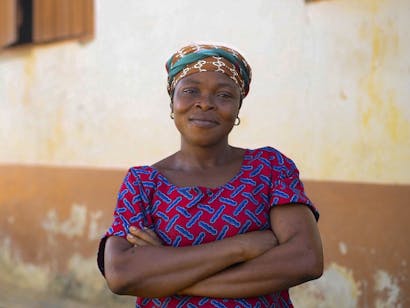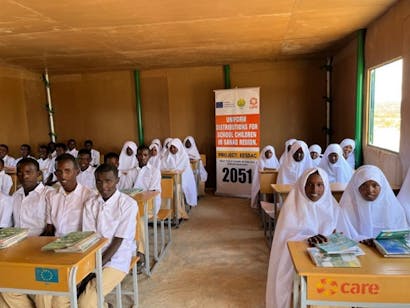CARE’s Partnerships with Financial Service Providers
Stimulating women’s access to and use of financial services is vital to poverty reduction. The gender gap in financial inclusion is one of the main barriers to women’s economic participation in low-income communities and also a barrier for regional economic growth and sustainable development.

The International Finance Corporation (IFC) estimates that 40 percent of formal micro, small and medium enterprises in developing economies have unmet financial needs, and this percentage is even larger when informal enterprises are taken into account; women-owned businesses account for a majority of these businesses with underserved financial needs.
Gender gap in financial inclusion
It is estimated that 980 million women around the world are not being adequately reached by financial institutions, and the gender gap in account ownership remains stuck at 9 percentage points in developing economies. Women also face more rigid social norms and gender-based barriers that constrain their access to and control over resources, have difficulties meeting collateral and guarantor requirements to access financial products, and have lower financial and digital literacy. Furthermore, in many cases, financial service providers do not offer products and services that serve women’s needs, interests, and priorities in different contexts. This financial exclusion limits their rights and their ability to live their lives as they choose/desire.
For CARE, financial inclusion through financial institutions should be based on the needs and desires of communities – particularly those who are most likely to be excluded. Moreover, the risks of using financial products and services should not outweigh the benefits that these financial services could bring.
Village Savings and Loans Associations
CARE has introduced millions of women to the concept of collective saving, through the flagship Village Savings and Loans Associations (VSLAs). These informal groups, with no outside investment, are a safe way to save money and take out small loans, and have been the foundation for many microenterprises. For over 10 years, CARE has also established partnerships with a range of financial institutions to facilitate women’s access to formal finance such as savings accounts, credit products and digital financial services. Many of the partnerships have leveraged VSLAs as platforms to link women to financial products and services that are developed to meet their needs, linking more than 50,000 groups representing over 1,300,000 members to formal Financial Service Providers (FSPs).
CARE’s report on partnerships with FSPs includes an overview of over 90 partnerships across the confederation, as well as lessons drawn from these partnerships to better serve the women and communities CARE works with.
Download the report on CARE Partnerships with Financial Service Providers via the button below.
All sources and references can be found in the full report. Please note that some links in the report refer to resources on CARE’s internal SharePoint platform, supporting CARE teams around the world.


